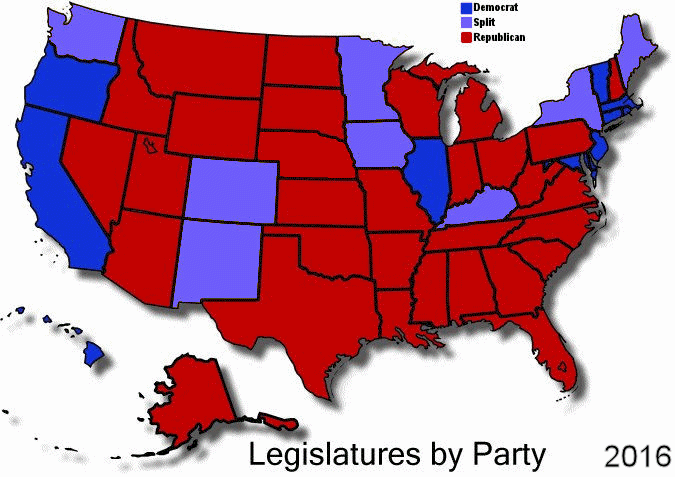Whether you are a Democrat or a Republican, one should not let this election go by without noting its impact - or lack thereof - on the Koch Bros control of the government entities that count, the state legislatures. In 2018 the Democrats picked up some control mostly in legislatures in which the control of the houses were split, as you can see in the graphic above. The Dems did pick up control of both houses of the New Hampshire legislature.
So long as votes are being counted, one could say there's a chance for a different outcome in 2020. But it appears that the Dems returned control of both houses in New Hampshire to the Republicans. And it appears the Dems have a chance to pick either or both houses in the Arizona legislature.
Of course this means that in all those red colored states, the Republicans will control the decennial redistricting of the U.S. House of Representatives and the legislatures.
But it appears Joe Biden might move into the White House in January and presumably over the next four years will reverse all those Executive Orders and other administrative and regulatory changes the Trump Administration put in place.
But most public policy in the United States will be limited. Many posts noting the Koch political machine are offered in this blog. Perhaps it is easiest to revisit the one regarding former Kansas Congressman and current Secretary of State Mike Pompeo to see what the implications of continued Koch policy will be in the case of Climate Change:
[U.S. Secretary of State Mike] Pompeo explained that we Americans will...
...instead of developing governmental policy as suggested in House Resolution 109 - Recognizing the duty of the Federal Government to create a Green New Deal and creating the bureaucracy needed to implement it.
- responsively reorganize our society,
- relocate as needed, and
- rely on future technological innovation
...The core conservative Climate Change view is addressed in the following policy statement:
- Yes, the climate is changing;
- Yes, a the changing climate likely will have impacts, perhaps some significant ones;
- No, we do not have an accurate prediction of what those impacts will be in the years 2025, 2050, 2100 or 2200;
- Individuals and businesses should recognize that over the next decades a need to adapt to changing climate conditions may arise requiring geographical relocation;
- Nations should recognize that over the next decades a need to adapt to changing climate conditions may arise requiring a responsive, evolutionary reorganization of society;
- Individuals, mostly through businesses as facilitated by free nations, will create technological advances which will allow for adaptation to and reductions in impacts from Climate Change;
- The United States Government in response to Climate Change at this time should not create complex economic and social policies, and the bureaucracies to implement them as suggested by the Democrats in H.R. 109, instead continue to rely upon the private sector and the states to address problems as they arise.
Since it is unlikely that the Democrats can get control of the U.S. Senate in the foreseeable future, it would appear that Pompeo's conservative policy will prevail into the next decade.
Yes, Biden could the U.S. rejoin The Paris Agreement. But as explained in a September 30, 2019, post, American participation will depend upon the efforts of the U.S. Climate Alliance depending upon state pollicy plus the efforts of the America’s Pledge organization bringing together private and public sector leaders to ensure the United States remains a global leader in reducing emissions and delivers the country’s ambitious climate goals of the Paris Agreement.
That is simply the product of Democrats not being able to gain control of the state governments. It can be seen in multiple policy arenas. And nothing the Sanders and AOC's of the world do address the problem. They are too enamored with the Presidency and the federal government to divert efforts to where they are needed. And they aren't going to move to Kansas.


No comments:
Post a Comment